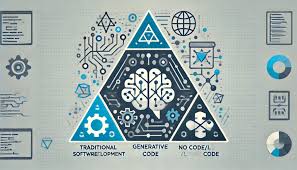No-Code Generative AI: Empowering Companies to Innovate Without Data Scientists
Many companies are eager to explore generative AI but often begin their journey by seeking in-house experts or freelancers, typically data scientists or machine learning (ML) engineers. This assumption can misdirect their efforts and resources. Organizations often misunderstand the roles necessary for successful generative AI adoption, leading to inefficiencies and over-complication.
Generative AI offers transformative potential, but implementing it effectively requires a clear understanding of project requirements, the roles involved, and the tools available. By leveraging no-code AI solutions, companies can bypass many traditional barriers and adopt generative AI more efficiently. This shift moves the focus from building models to integrating and orchestrating pre-trained models, enabling quicker, cost-effective innovation.
Roles in Traditional AI Projects: A Complex Puzzle
Traditional AI projects demand several specialized roles to build an end-to-end solution, including:
- Subject Matter Experts (SMEs): Define problems and goals using domain knowledge. SMEs validate solutions but often lack the technical expertise needed for solution design.
- Data Scientists: Translate business needs into technical requirements, build and validate models, and collaborate with SMEs and ML engineers.
- Application Engineers: Integrate AI models into user-facing solutions, focusing on production-ready interfaces and systems.
Each role is crucial, but the complexity of managing this multidisciplinary approach increases costs and extends timelines.
The Data Scientist Misconception
Organizations often overestimate the relevance of data scientists for generative AI projects. Two key misunderstandings are common:
- What Data Scientists Actually Do:
Data scientists spend much of their time on data wrangling, stakeholder collaboration, and model maintenance. Contrary to popular belief, model building and validation constitute less than 25% of their work. - What Generative AI Projects Actually Require:
Most generative AI projects rely on pre-trained models, such as OpenAI’s GPT-4, which are accessible via APIs. These projects require orchestration skills, not the foundational expertise of data scientists.
The Paradigm Shift: Pre-Trained Models and Orchestration
Pre-trained models significantly lower entry barriers for generative AI. Companies no longer need to train models from scratch—a process requiring vast data, computational resources, and specialized talent. Instead, businesses can focus on:
- Orchestrating Pre-Trained Models: Using APIs to integrate models into applications.
- Prompt Engineering: Structuring effective interactions with models.
- Application Integration: Embedding AI capabilities into workflows to deliver value.
The emphasis shifts from technical model development to efficient orchestration, making generative AI projects faster, cheaper, and more accessible.
The Role of No-Code AI Platforms
No-code AI platforms streamline generative AI development by offering pre-built templates for common workflows. For instance, entAIngine allows users to connect data sources, define orchestrations, and automate processes. This approach enables:
- Rapid Development: Orchestration templates simplify repetitive tasks.
- Cost Efficiency: Reducing reliance on specialized talent.
- Accessibility: Empowering process-driven individuals, regardless of technical expertise, to implement AI solutions.
While complex tasks like system integration may still require engineers, no-code platforms allow most generative AI applications to be built by tech-savvy team members with minimal training.
Democratizing AI for Broader Innovation
Generative AI’s potential lies in its ability to be democratized. By adopting no-code tools and focusing on orchestration, companies can empower employees across departments to participate in AI innovation. This approach reduces costs, accelerates development, and shifts the focus to solving business problems rather than managing technical complexities.
The future of AI belongs to everyone, and no-code platforms are the key to making this vision a reality. By embracing this approach, enterprises can ensure that AI-driven innovation is inclusive, efficient, and transformative.











